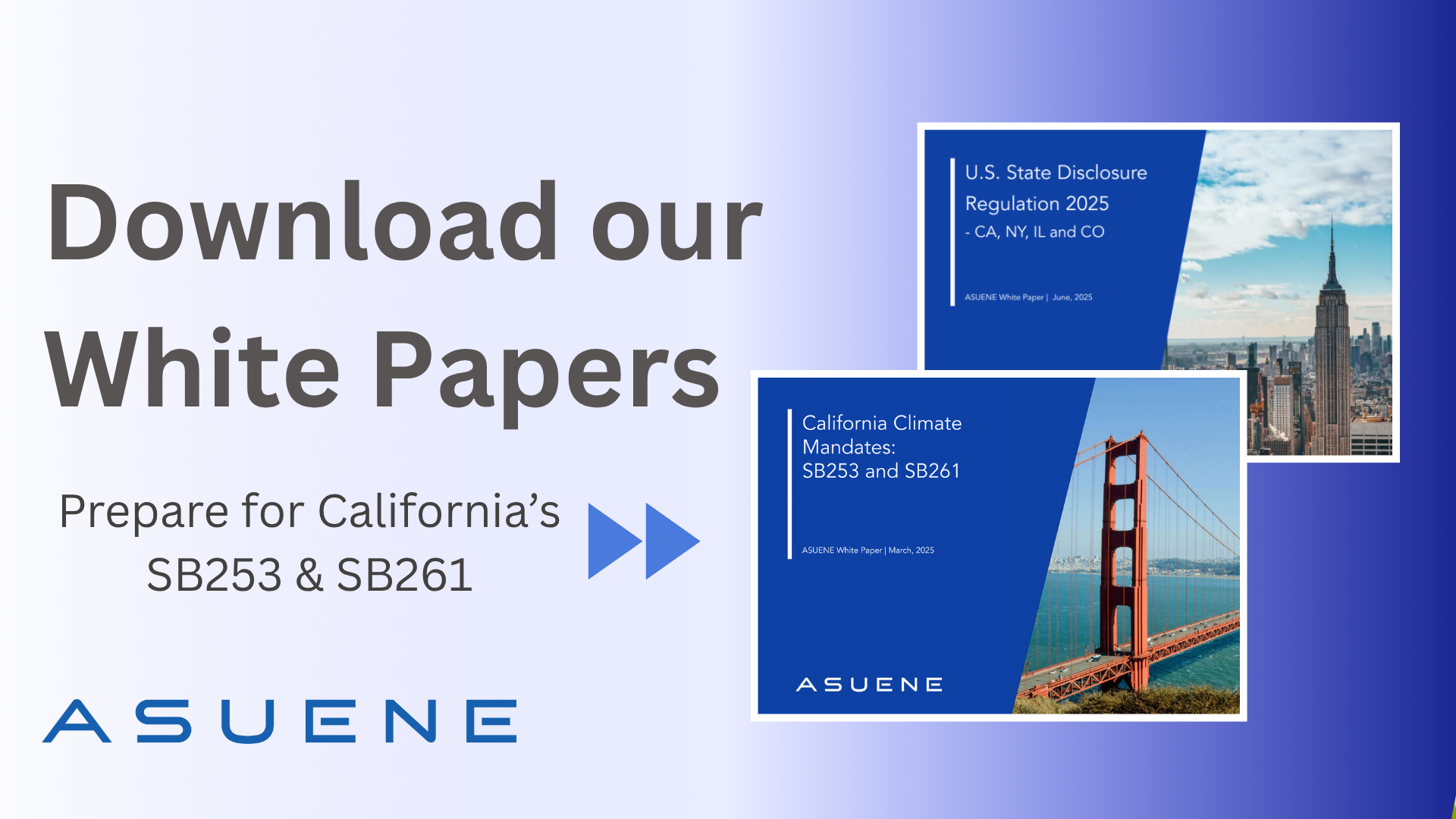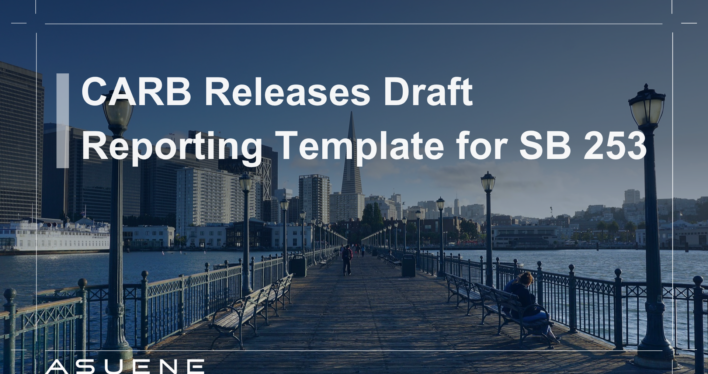- Article Summary
-
1. Introduction: California Moves From Climate Pledge to Practice
The California Air Resources Board (CARB) has released the draft greenhouse gas reporting template under the Climate Corporate Data Accountability Act (SB 253). This marks a major milestone in the state’s effort to standardize corporate emissions disclosure and strengthen climate accountability. The template provides the first concrete guidance for companies that will soon be required to report their greenhouse gas emissions.
SB 253 forms part of California’s twin disclosure laws, alongside SB 261, and aims to make emissions transparency mandatory for large enterprises. By releasing this draft, CARB signals a clear shift from legislative design to operational detail. This article explains who must comply, what the draft template contains, and how companies can prepare with ASUENE’s support.
2. Who Must Report Under SB 253 and When
SB 253 applies to all public or private companies doing business in California with annual global revenue above USD 1 billion. The threshold captures both domestic and international corporations if they have business activity in the state.
The disclosure timeline is phased:
| Year | Milestone | Scope |
|---|---|---|
| 2025 | Voluntary testing and feedback on draft template | — |
| 2026 | Mandatory disclosure of Scopes 1 and 2 (limited assurance) | Direct operations |
| 2027 | Addition of Scope 3 reporting (value chain) | Full GHG inventory |
| 2028+ | Transition to reasonable assurance and enforcement | Ongoing compliance |
CARB will collect public feedback through workshops in late 2025 and early 2026. The agency will finalize the template, develop a digital submission platform, and publish detailed guidance for assurance and verification procedures.
3. Inside the Draft Template: What Companies Must Disclose
The draft template outlines the information companies must submit to ensure consistency, traceability, and transparency. It is structured to align with established frameworks such as the GHG Protocol and CDP.
| Section | Key Fields | Why It Matters |
| Organizational Profile | Legal entity name, NAICS code, contact info, fiscal year | Enables comparability across sectors and ensures identification consistency |
| Reporting Boundary | Operational or equity control, excluded facilities, consolidation approach | Clarifies accountability and aligns with GHG Protocol standards |
| Scope 1 and 2 Emissions | Direct combustion, purchased electricity, total emissions (tCO₂e), emission intensity metrics | Quantifies operational footprint and supports benchmarking |
| Methodology | Data sources, emission factors, calculation methods, assumptions | Ensures transparency, reproducibility, and audit readiness |
| Verification | Third-party assurance provider, type (limited or reasonable), statement reference | Builds credibility and investor confidence |
| Reduction Measures | Renewable energy contracts, efficiency projects, offset use (if any) | Connects disclosure with measurable mitigation actions |
Scope 3 reporting fields are not yet included and will be added in a future update. The use of the draft template will remain voluntary in its first year. Digital upload specifications will be finalized after public consultation.

4. How ASUENE Can Help Companies Navigate SB 253
ASUENE provides comprehensive support for organizations preparing to comply with SB 253. Our platform and professional services help companies collect, verify, and report greenhouse gas data in line with CARB’s draft structure.
Key areas of support include:
- Data integration: Automated collection of energy and emissions data from operations and purchased electricity.
- Boundary definition: Assistance in identifying covered entities and facilities under California’s reporting requirements.
- Audit-ready reporting: Structured data management that meets CARB’s traceability and documentation expectations.
- Assurance and verification support: Guidance and coordination with accredited third-party verifiers to ensure compliance with limited and reasonable assurance standards.
- Scope 3 readiness: Tools for modeling and engaging with suppliers ahead of the 2027 requirement.
- Framework alignment: Mapping between SB 253 and CSRD, ISSB, and CDP to streamline disclosure efforts.
ASUENE’s end-to-end approach helps companies move from data collection to verified disclosure while reducing reporting complexity and ensuring readiness for regulatory scrutiny.
5. What Comes Next: From Draft to Enforcement
CARB will refine the template based on stakeholder feedback and finalize it in 2026. The agency will also issue guidance for assurance providers, specify file formats for the online reporting portal, and clarify how Scope 3 data will be integrated in later years.
Beyond California, this framework is expected to influence climate disclosure policy across the United States. Other states and federal regulators are watching how CARB operationalizes mandatory reporting and assurance. The draft template demonstrates a shift toward standardized, verifiable climate data that can be compared across sectors and jurisdictions.
For companies, early engagement is essential. Testing the draft template, aligning data systems, and building assurance relationships now will ensure smoother compliance when reporting becomes mandatory. CARB’s release marks the start of a new phase in U.S. corporate climate accountability, where transparency becomes an operational requirement rather than a voluntary statement.
Download Our Whitepapers

For a deeper dive into compliance strategies and emerging disclosure trends, explore our whitepapers:
- California’s New Climate Disclosure Laws / 10 Pioneer Initiatives by U.S. Businesses, States and Cities
- TCFD Framework: Key Processes and Considerations at Each Stage
- U.S. State Disclosure Regulation 2025 – CA, NY and IL
These resources provide timelines, reporting strategies, and practical checklists to help your business stay ahead of California’s climate accountability rules and prepare for the next era of corporate disclosure.
Why Work with ASUENE Inc.?
ASUENE is a key player in carbon accounting, offering a comprehensive platform that measures, reduces, and reports emissions. ASUENE serves over 10,000 clients worldwide, providing an all-in-one solution that integrates GHG accounting, ESG supply chain management, a Carbon Credit exchange platform, and third-party verification.
ASUENE supports companies in achieving net-zero goals through advanced technology, consulting services, and an extensive network.

